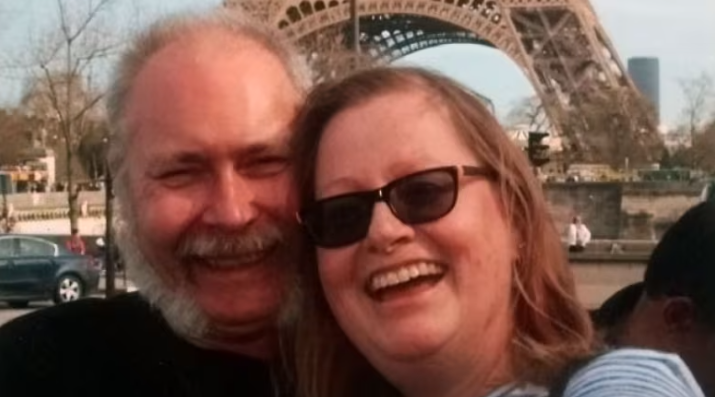Winnipeg man decries ‘degrading and dehumanizing’ lack of palliative home care for partner

Katherine Ellis came home from hospital in January, still hasn’t gotten home care, partner says
When Katherine Ellis decided to come home for palliative care last month after being diagnosed with Stage 4 pancreatic cancer, she thought she’d be comfortable, spending her final days surrounded by loved ones.
Instead, the 62-year-old Winnipeg woman has been lying in the same bedsheets for weeks without more than a sponge bath because the help she was promised never arrived, her partner of a decade said.
“The Winnipeg Regional Health Authority, despite a lot of promises, has been unable to provide … home care workers,” Eric De Schepper, 58, said on Thursday.
For nearly five weeks now, De Schepper said that has meant his common law spouse’s caregiving has been left solely to him, even though he can’t help her out of bed or fully bathe her on his own.
He said he’s asked their palliative care co-ordinator weekly for the home care they were supposed to get and was told they don’t have the resources to send workers.
“I’d like to ask anybody, challenge anybody, how would you feel after being treated for four weeks like that? It’s just degrading and dehumanizing,” De Schepper said.
- Manitoba nurses quitting amidst mandated overtime, high vacancy rates, no home-life balance
- Manitoba spent $3.9M in 1 year on private nurses to fill shortages in Winnipeg, Opposition NDP says
A cancer support organization he contacted was able to hire home care workers to bathe and take care of Ellis for a few hours on Wednesday, but De Schepper said that support is limited. Still, that day made all the difference for his partner.
“She had a smile on her face, something I haven’t seen in a very long time,” he said. “But beyond that, the system itself, the regional health authority, has totally failed.”

Staffing failure: union
The head of the union that represents more than 14,000 health-care support workers in the Winnipeg Regional Health Authority and Shared Health says she wouldn’t disagree with De Schepper.
“I believe this government has failed people with the health-care system by not having enough people in place to look after people at home,” said Debbie Boissonneault, the president of CUPE Local 204, in an interview Thursday.
Boissonneault, a health-care aide by trade, says she’s been with families at their loved one’s end of life and it’s very hard on people at the best of times.
“Everybody has a right to health care and I think that having someone be in their own home at this time is important,” she said, adding she hopes that De Schepper gets that help.
- New website connects Manitobans who need home, respite care with service providers
- Manitobans who manage own home care squeezed by rising expenses, worker shortages
A WRHA spokesperson acknowledged there continues to be a home care worker shortage, and said the authority recognizes the important needs of palliative care patients.
The spokesperson said in an email on Thursday the WRHA is prioritizing filling services as soon as possible to support those patients and their families at home.
They added the health authority’s palliative care nurses have been providing care to the family in this case, and case co-ordinators were in touch to schedule further services.
Action came ‘way too late’
Ellis was a Winnipeg Transit driver for about 15 years before leaving on short-term disability when she started having health issues, De Schepper said.
She was diagnosed with cancer in November, but her most recent hospital visit was in December, when she was rushed to the emergency room in diabetic shock.
De Schepper said she was told an operation wouldn’t be an option, and chemotherapy wouldn’t help extend her life by that point, so Ellis opted against it.
De Schepper was at first still going to his job as a school bus driver while caregiving, but realized this month he would have to take a leave of absence and apply for employment insurance caregiving benefits so he could properly care for his partner.
During an interview on Thursday, De Schepper said he got a call from the WRHA telling him they’d finally been able to arrange home care for him. But since he said Ellis likely only has one or two more weeks to live, that wasn’t much of a comfort.
“The only thing we can do now for her as a family, and as a caregiver, is keep her comfortable make sure she’s pain free and that she’s surrounded by her family,” including her three sons, he said.
“Anything that’s coming now is just way too late.”
And while De Schepper knows Ellis’s illness means they won’t be able to spend their retirement together travelling the world like they planned, he said the worst part of it all has been how they were treated by the health-care system that was supposed to help them.
- Manitoba health-care support workers want new deal after 5 years without a contract
-
CBC INVESTIGATES
Winnipeg sisters say inadequate home-care funding leaves them paying out of pocket, $30K in debt
“The system badly failed her in her last hours of need,” he said.
De Schepper said he wants to speak out in case it helps change things for someone else.
“This is my hope: that I’m this one guy that’s standing on top of a mountain throwing a pebble — and eventually it’s going to cause an avalanche,” he said.
Related News
Trade war, slumping border traffic: What does that mean for the Gordie Howe bridge?
Amid U.S. President Donald Trump’s tariffs which have triggered a trade war with Canada, cross-border trips haveRead more
Trump administration threatens Harvard’s foreign enrolment, tax-exempt status
U.S. Homeland Security Secretary Kristi Noem speaks during an event on April 9, in Washington,Read more
